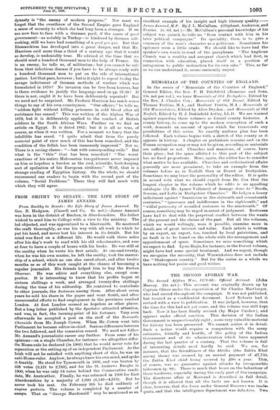FROM SMITHY TO SENATE: THE LIFE STORY OF JAMES ANNAND.
From Smithy to Senate: the Life Story of James Annand. By Geo. B. Hodgson. (Cassell and Co. 6s. net.)—James Annand was born in the district of Buchan, in Aberdeenshire. His father wished to send him to College with a view to the ministry. The lad objected, and was apprenticed to a blacksmith. He mastered the craft thoroughly, as was his way with all work to which be put his hand, and never lost his interest in its details. But his mind was fixed on a different life. He would walk three miles after his day's work to read with his old schoolmaster, and rose at four to have a couple of hours with his books. He was still at the smithy when he wrote his first article. At one-and-twenty, when he was his own master, he left the smithy, took the master- ship of a school, which no one else cared about, and after twelve months or so of this work caught at the chance of becoming a regular journalist. His friends helped him to buy the Buchan Observer. He was editor and everything else, except com- positor. It is interesting to know that his profits began at sixteen shillings a week, and averaged twenty-five shillings during the time of his editorship. He contrived to contribute to other journals, the Scotsman among them. After about seven years he sold his share in the paper and went South, and after unsuccessful efforts to find employment in the provinces reached London. At first London seemed as hopeless as other places. But a long letter published by the Spectator attracted attention, and was, in fact, the turning-point of his fortunes. Very soon afterwards he accepted a post on the staff of the Newcastle Chronicle from Mr. Joseph Cowen. When Mr. Cowen went into Parliament he became editor-in-chief. Serious differences between the two followed, and the connexion ceased. We need not follow Mr. Annand's journalistic career any further. From some of his opinions—on a single Chamber, for instance—we altogether differ. On Home-rule he declared (in 1906) that he would never vote for separation or the setting up of an independent Parliament. As the Irish will not be satisfied with anything short of this, he was an anti-Home-ruler. Anyhow, he always knew his own mind, and spoke it frankly. He stood for Tynemouth in 1892, and was beaten by 338 votes (3,121 to 2,783), and for the St. Andrews Burghs in 1900, when he was only 64 votes behind the Conservative candi- date, Mr. Anstruther. Finally, he was returned in 1906 for East Aberdeenshire by a majority of 1,830 (6,149-4,319). But he never took his seat. On February 9th he died suddenly of angina pectoris. The volume is completed by a number of "Bays. That on "George Macdonald" may be mentioned as an excellent example of his insight and high literary quality.— James Annand,M.P. By J. L. McCallum. (Oliphant, Anderson, and Ferrier. 2s. 6d. net.)—Mr. McCallum's personal knowledge of his subject was gained, he tells us, "from contact with him in his later political campaigns." Its speciality, then, is to give a summary of the man's character as a politician. Sometimes his epitomes seem a little crude. We should like to have had the speaker's own words instead of the paraphrase. "The Anglican Church was a wealthy and arrogant church which had first, in connection with education, placed itself in a position of antagonism to public instruction for its own sake." This, as far as we can understand it, seems eminently unjust.






















































 Previous page
Previous page